Technical Pens for Drawing
Updated: 25 Feb 2026
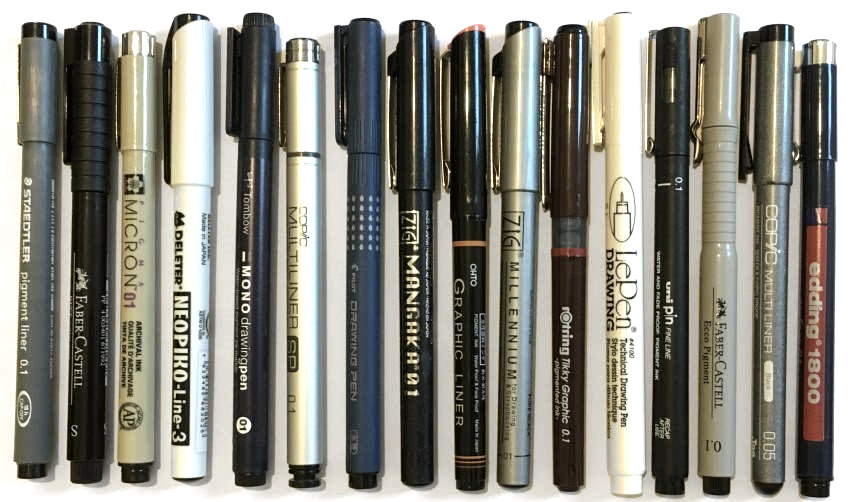
What is a technical pen?
A technical pen, also known as a fine liner, is a pen intended for technical drawing, for use by engineers, architects, and drafters.
Its purpose is to draw lines of uniform thickness. Artists and graphic designers also use these pens as drawing pens.
Review for recommended brands of technical pens:
- Winsor & Newton Fine Liner
- Faber-Castell Ecco Pigment
- Faber-Castell Pitt Artist Pen
- Marvy Le Pen Drawing
- Staedtler Pigment Liner
- Copic multiliner SP
- Sakura Pigma Micron
- Uni PIN Fine Line
- Edding 1800 Profipen
- Pilot Drawing Pen
- Zig Mangaka
- Zig Millennium
- Deleter Neopiko Line 3
- Ohuhu Fine Line Drawing Pen
- Tombow MONO Drawing Pen
- OHTO Graphic Liner
- Rotring Tikky Graphic
Disclosure: some links in this article are affiliate links, meaning, at no additional cost to you, I will earn a commission if you choose to make a purchase.
Note:
All pens in this article are owned and tested by me, and all drawings were made by me.
At the end of this guide, you will find some pen drawing tips.
1. Winsor & Newton Fine Liner
The fine liners by Winsor & Newton have a beautiful, smooth structure, with a long barrel.
Nib sizes: 6
Also available in Cool Gray, Indigo Blue, and Sepia for sizes 0.1, 0.3, and 0.5 mm.
 Winsor & Newton Fine Liner
Winsor & Newton Fine Liner
Pros:
- Long barrel
- Water-resistant, non-fading pigment
- Tapered nib
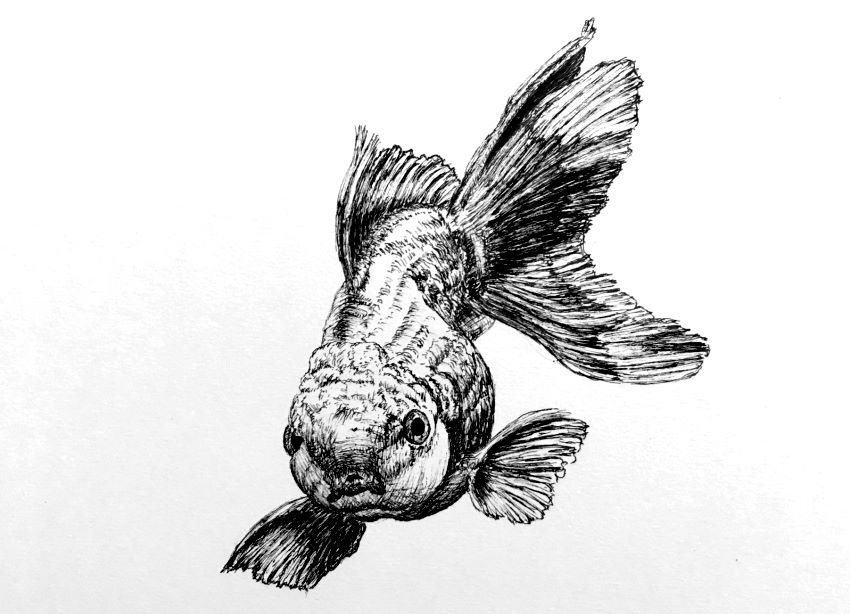 Goldfish with Winsor & Newton
Goldfish with Winsor & Newton
Conclusion:
I love these pens; they are smooth and easy to work with.
Unlike many fine liner brands, their structure has a beautiful design.
Their body is longer than most other fine liner brands.
Lovely tapered nib, which gives a better view of the drawing paper.
2. Faber-Castell Ecco Pigment
The Faber-Castell Ecco Pigment technical pen is second to none in that price range. High-grade, consistent, and comfortable.
Nib sizes: 8
These drawing pens are lightfast, meaning their ink is resistant to fading when exposed to light.
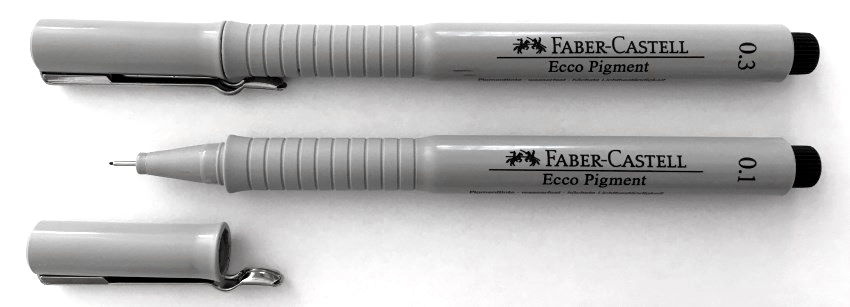 Faber-Castell Ecco Pigment
Faber-Castell Ecco Pigment
In addition to black ink, Ecco Pigment pens are available in 3 colors: red, green, and blue.
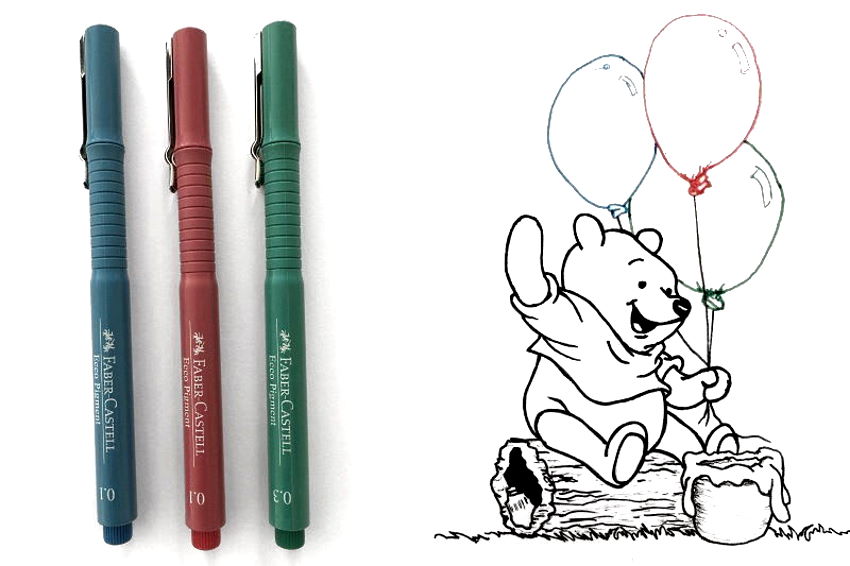 Winnie the Pooh drawing
Winnie the Pooh drawing
Pros:
- Wide variety of nib sizes
- Pigmented ink, lightfast, permanent, acid-free, archival
- High-quality ergonomic structure
Cons:
- No size caption on the top part of the cap
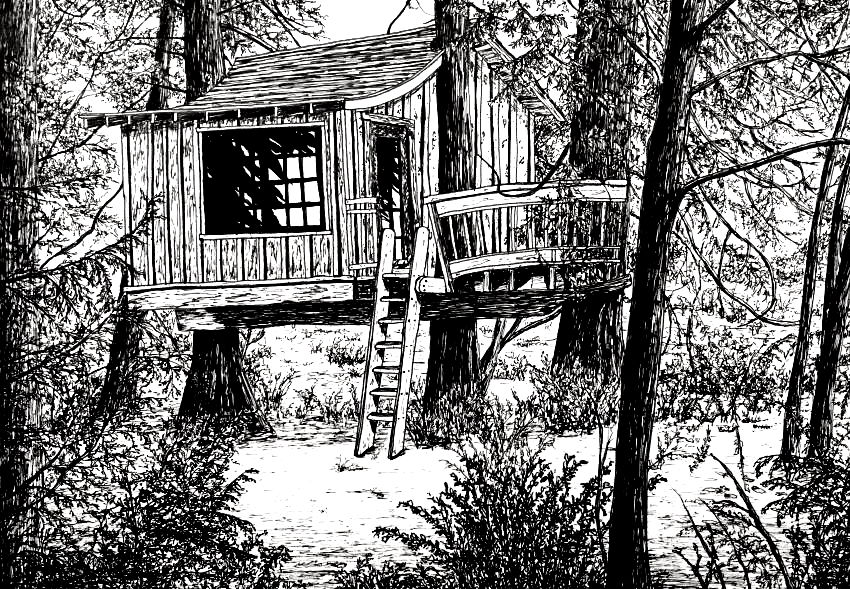 Tree house drawing with Ecco Pigment
Tree house drawing with Ecco Pigment
Conclusion:
The Faber-Castell Ecco Pigment is flawless, with superior ergonomic structure.
Highly recommended for any type of art, from top-quality drawings to doodling, manga, sketching, and creating coloring pages.
3. PITT Artist Pen
The Faber-Castell Pitt Artist Pen is great for graphic designers, illustrators, and cartoonists.
Nib sizes: 4
These drawing pens produce thick, vivid lines with pigmented, lightfast ink.
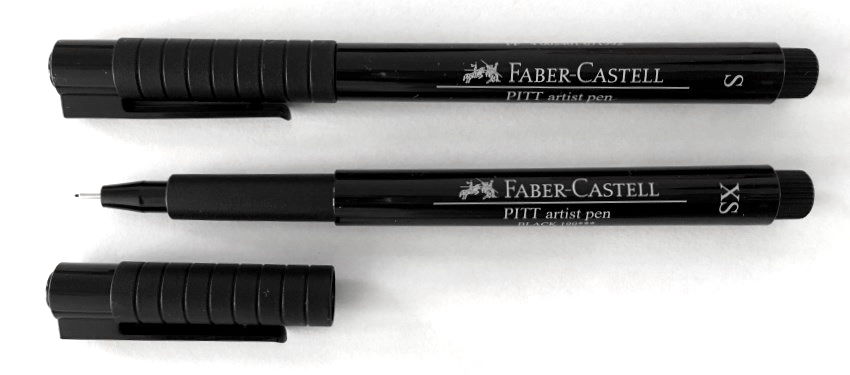 PITT Artist Pen
PITT Artist Pen
Pros:
- Affordable price when buying a set of 4
- The ink is water-resistant, permanent, odor-free, acid-free, and pH neutral
Cons:
- Only 4 nib sizes
- Actual size in millimeters not written
 Tower of Pisa with PITT
Tower of Pisa with PITT
Note:
In many cases, you only need one or two pen sizes.
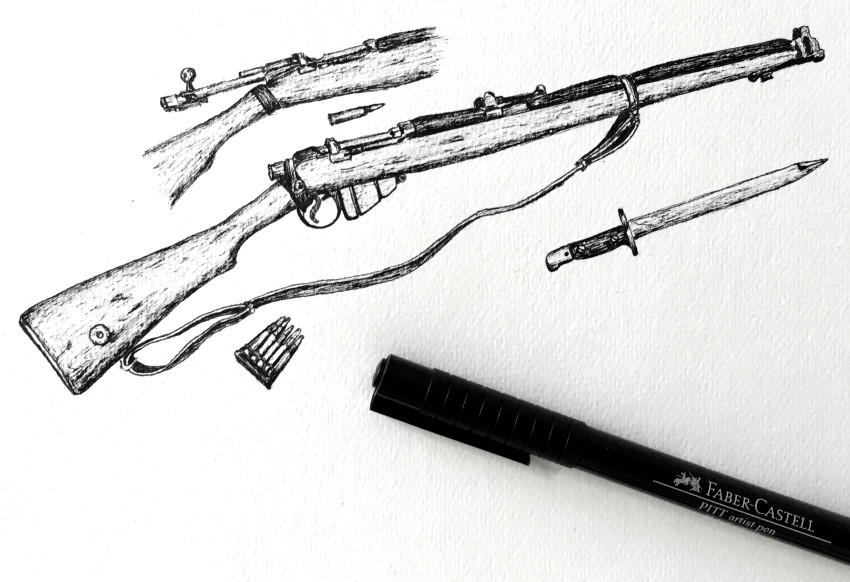 SMLE No. 1 Mk III rifle
SMLE No. 1 Mk III rifle
Conclusion:
Like other Faber-Castell products, these fine liners offer quality. They offer a limited size range, though.
4. Marvy Le Pen Drawing
Marvy Le Pen Drawing fine liners are water-based, with pigmented ink.
Nib sizes: 7
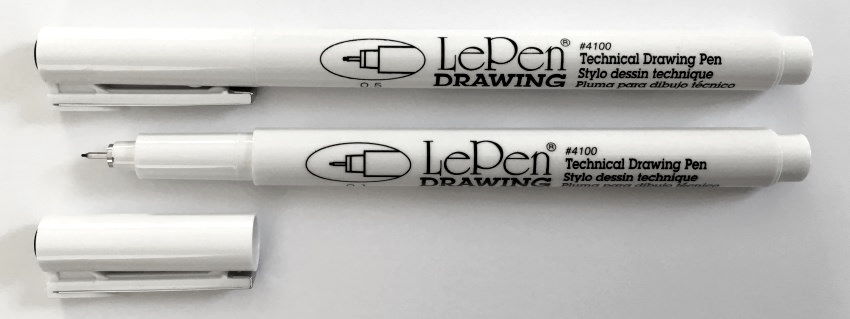 Marvy Le Pen Drawing
Marvy Le Pen Drawing
Pros:
- Pigmented ink, lightfast, archival quality
- Fast-drying, smudge-resistant, acid-free, non-toxic
- Caption on the top part of the cap to quickly find the desired size
Cons:
- Simple structure
Farm drawing, homage to George Henry Durrie (1820–1863):
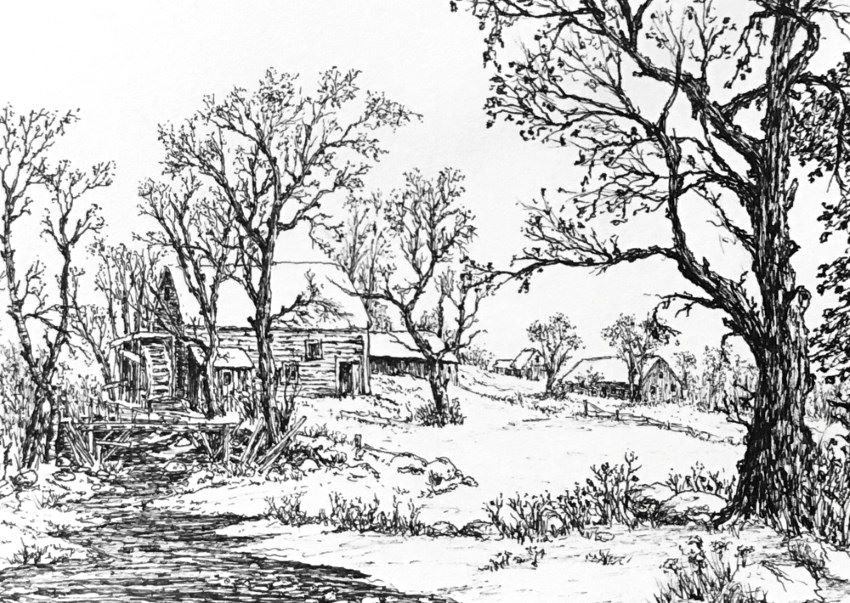 Farm drawing with Marvy Le Pen
Farm drawing with Marvy Le Pen
Conclusion:
Affordable drawing pens for the art hobbyist.
When buying a set, you get a quality brush pen besides a nice range of nib sizes.
5. Staedtler Pigment Liner
Pigment Liner pen by Staedtler is a quality, disposable pen with indelible, lightfast, and waterproof pigment ink.
Nib sizes: 12
According to Staedtler, these pens can be left uncapped for at least 12 hours without drying.
*I tested (left uncapped for 12 hours) one of my Staedtler pens (size 0.3), and it works well.
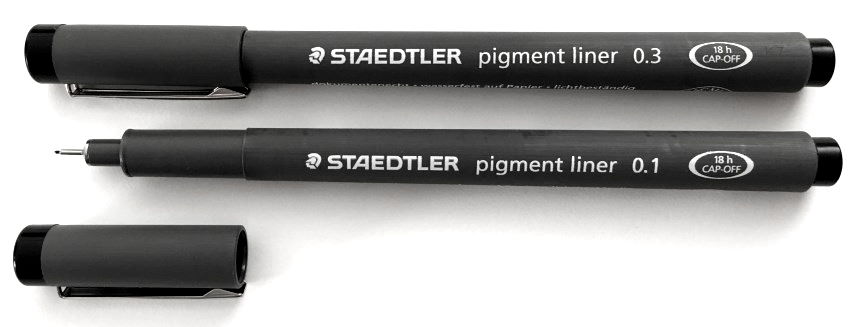 Staedtler Pigment Liner
Staedtler Pigment Liner
Pros:
- High-quality, lightfast, pigmented ink
- Wide variety of nib sizes
- Caption on the top part of the cap to quickly find the desired size
- These pens can be left with the cap off while sketching or drawing
Cons:
- Simple structure
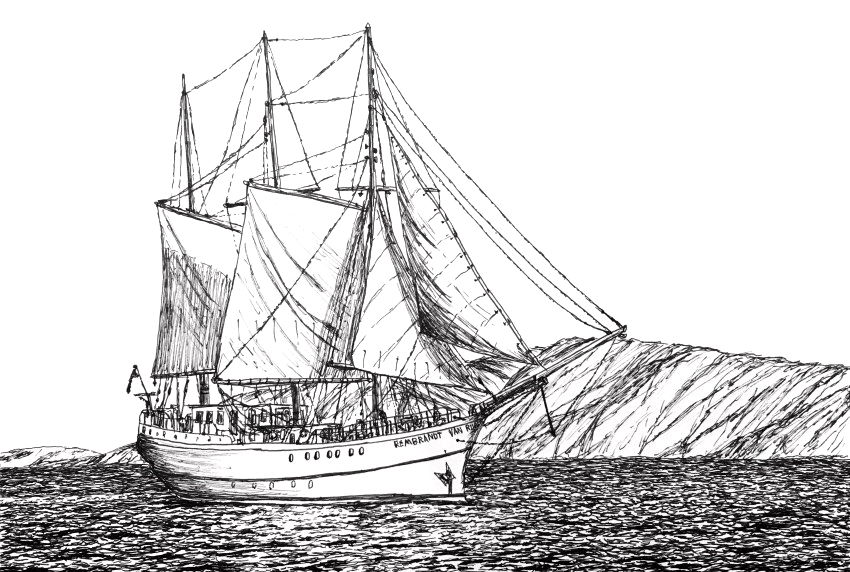 Sailboat drawing with Staedtler Pigment Liner
Sailboat drawing with Staedtler Pigment Liner
Conclusion:
With 12 nib sizes and high-quality ink, the Staedtler Pigment Liner is a good example of an excellent artist-grade drawing pen.
Tip:
You can use pens with other mediums. Also known as mixed media.
In the next example, I drew (using a pen) a homage to Kim Jung Gi's pen drawing. I drew Kim Jung Gi with a graphite pencil.
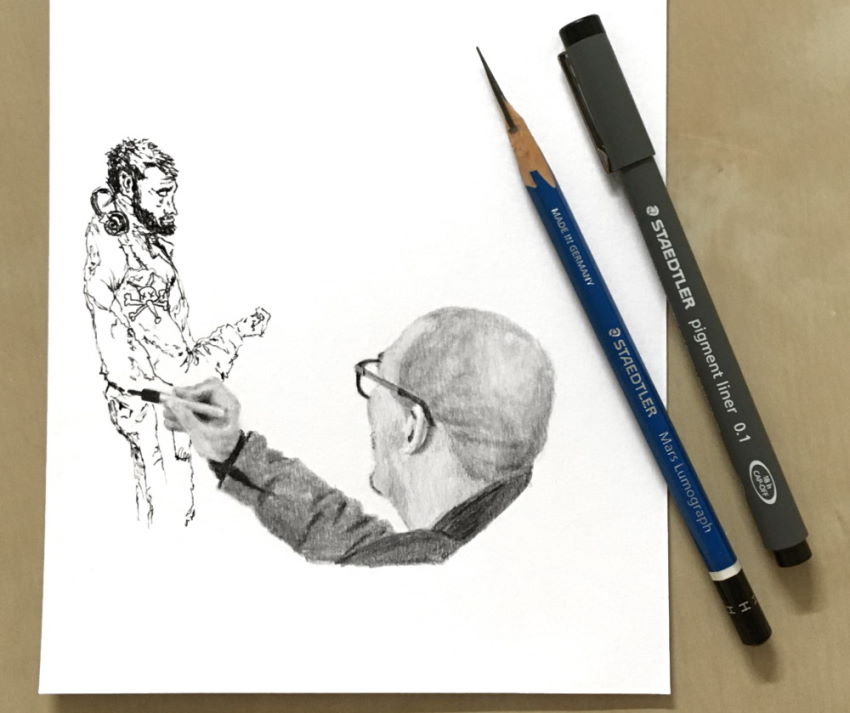 Kim Jung Gi (1975-2022)
Kim Jung Gi (1975-2022)
6. Copic Multiliner SP
The Copic Multiliner SP technical pen is designed for a lifetime of use.
Nib sizes: 9
Filler and nibs for Copic Multiliner SP can be replaced when necessary.
Besides black, these pens come in 12 colors.
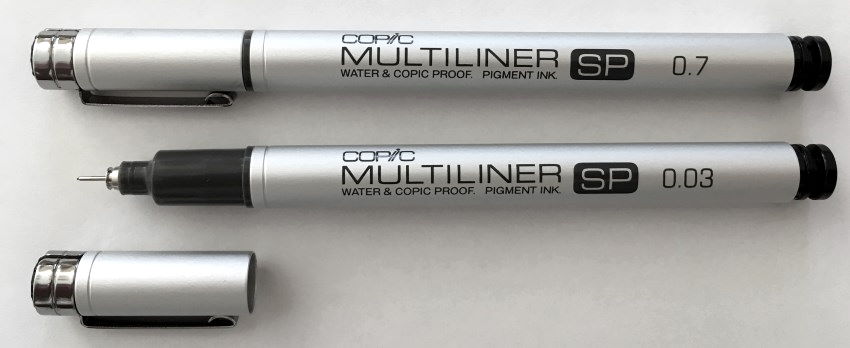 Copic Multiliner SP
Copic Multiliner SP
In addition to the SP model, a non-SP disposable Multiliner pen exists, and it is cheaper.
 Copic Multiliner
Copic Multiliner
Pros:
- Wide variety of nib sizes
- Refillable
- Replaceable nibs
- Durable, non-smearing ink
- A high-quality technical pen with a beautiful design and a smooth aluminum body
- Caption on the top part of the cap to quickly find the desired size
Cons:
- Pricey
- Nibs for small sizes are gentle and can bend if not careful
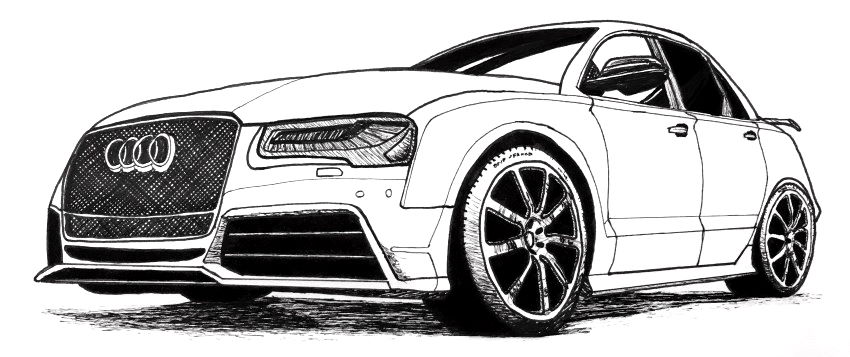 Car drawing with Copic Multiliner SP
Car drawing with Copic Multiliner SP
Conclusion:
Compared to other technical pens in this review, Copic is significantly expensive.
Its nibs will wear down with time, but they are replaceable.
That said, it delivers with high-quality, beautiful design, and it is long-lasting.
Good to know:
With time and use, most nibs will wear down until they become useless (due to friction).
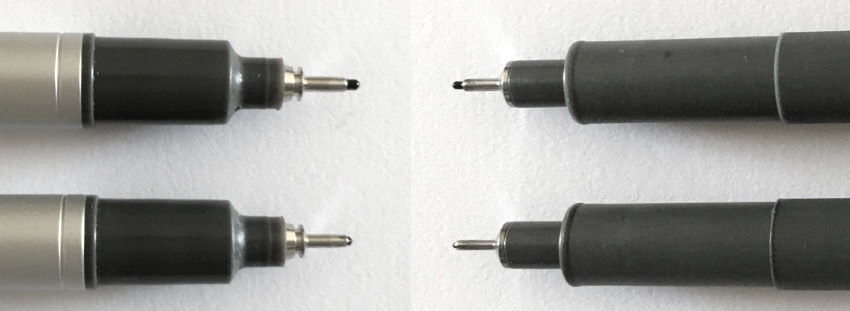
7. Pigma Micron by Sakura
The Pigma Micron disposable pen is a favorite with illustrators, and for a good reason.
Nib sizes: 8
These pens have a durable ink made of pigments. They are manufactured by Sakura.
In addition to black, these pens come in 14 colors for the nib size 0.45 mm. Fewer colors for other nib sizes.
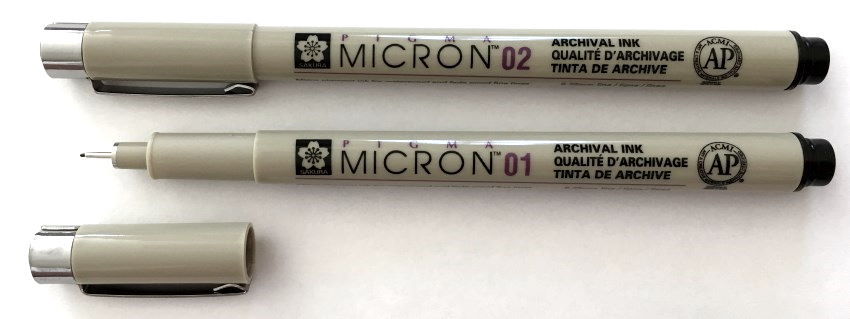 Pigma Micron
Pigma Micron
Pros:
- High-quality, durable, pigmented ink
- Affordable price
- Caption on the top part of the cap to quickly find the desired size
Cons:
- Simple structure
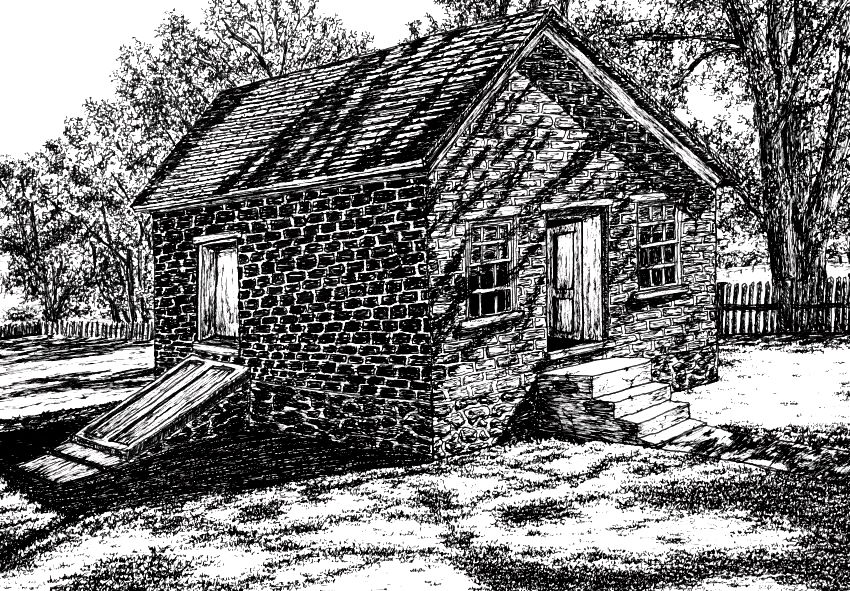 House drawing with Pigma Micron
House drawing with Pigma Micron
Conclusion:
Not that attractive design, but good price and quality ink make the Pigma Micron a favorite for many artists and graphic designers for drawing manga, comics, and sketches. Recommended!
Author's comment:
If you are on a budget, one technical pen with a nib size of 0.1 should do the job.
Depending on the brand, size 0.1 can produce fine details and still produce noticeable marks.
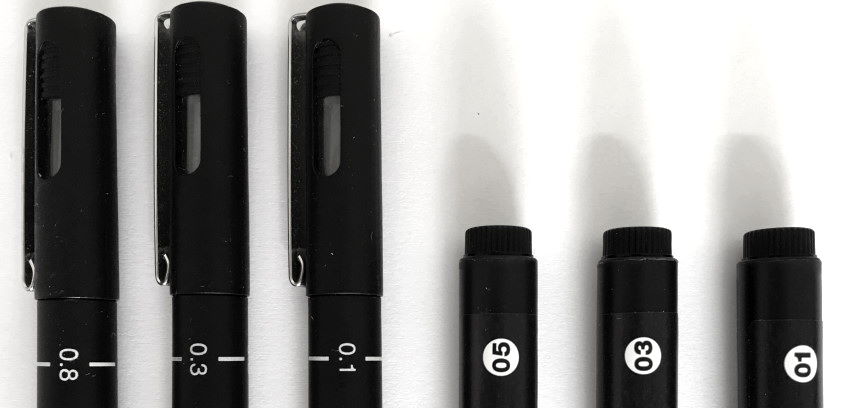
An additional (second) recommended size would be 0.5, since it creates bold outlines that are great for drawing coloring pages or cartoon characters.
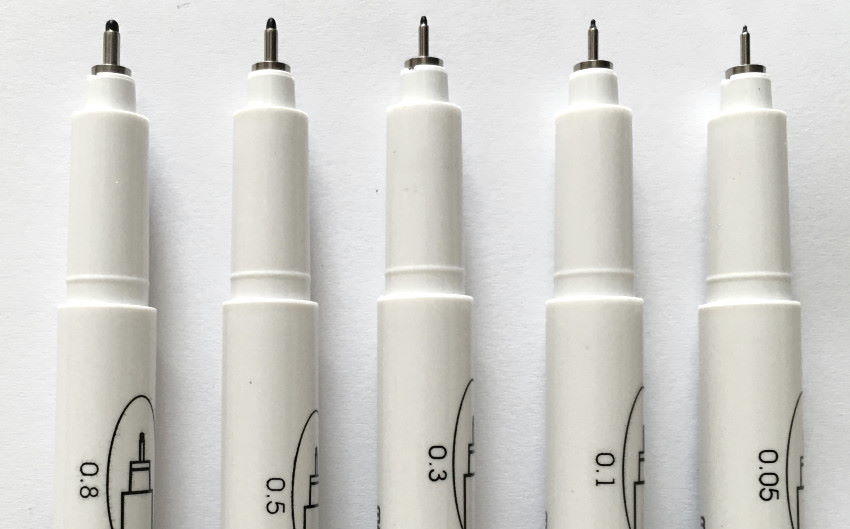
That said, many brands offer small sets of 3 to 5 nib sizes at an affordable price.
8. Uni PIN Fine Line
The Uni PIN Fine Line is known for its consistent lines and strong black ink.
Nib sizes: 10
Fade-proof and water-resistant ink.
In addition to black, sizes 0.1 and 0.5 come in 5 colors.
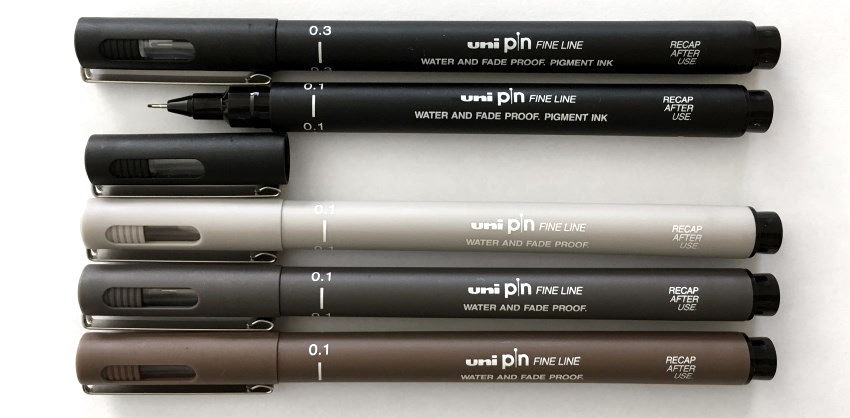 Uni PIN Fine Line
Uni PIN Fine Line
Pros:
- Fade-proof and water-resistant ink
- Affordable price
- Wide variety of nib sizes
- Caption on the top part of the cap to quickly find the desired size
Cons:
- Simple structure
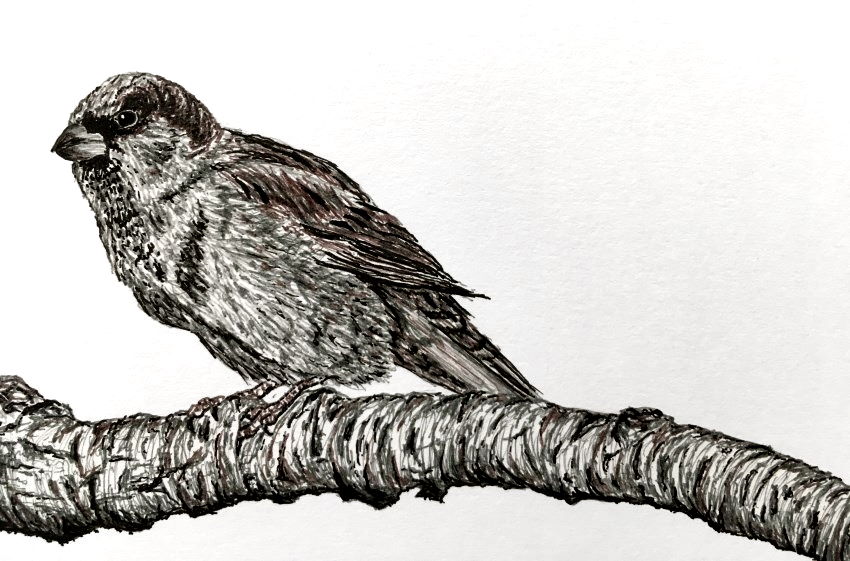 Sparrow bird drawing with Uni PIN fine line
Sparrow bird drawing with Uni PIN fine line
Conclusion:
The Uni PIN Fine Line is another example of a good drawing pen. The nib size is well-written for ease of use.
These fine liners produce well-defined lines, which are great for technical drawing, signatures, mandalas, and drawing in perspective using a ruler.
9. Edding 1800 Profipen
The Edding 1800 Profipen disposable pen is a good drawing and sketching pen.
Nib sizes: 4
Lightfast, waterproof pigment ink.
These pens come in 4 colors: black, red, blue, and green.
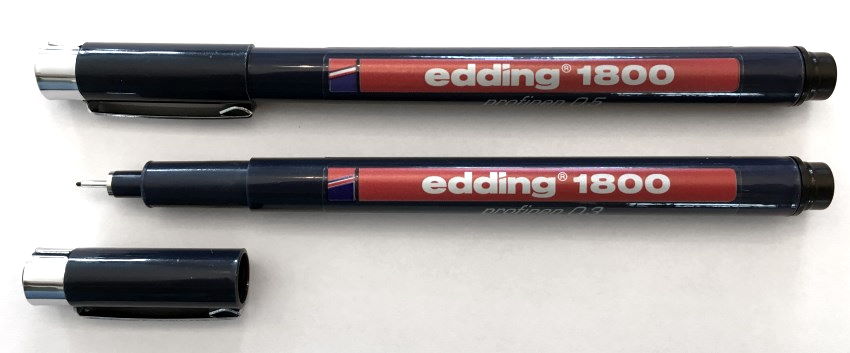 Edding 1800 Profipen
Edding 1800 Profipen
Pros:
- Waterproof pigmented ink
- Caption on the top part of the cap to quickly find the desired size
Cons:
- Pricey
- Only 4 nib sizes
- Simple structure
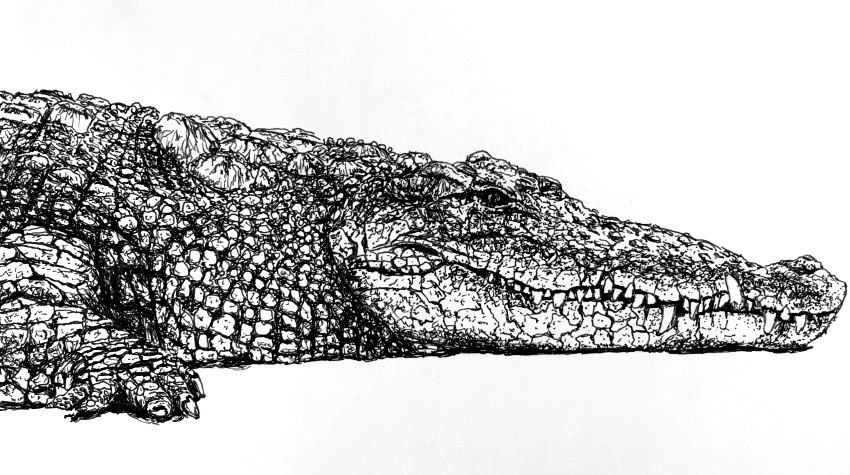 Crocodile drawing with Edding 1800
Crocodile drawing with Edding 1800
Conclusion:
The Edding 1800 is a good pen when it comes to ink quality, but they are limited in nib sizes.
10. Pilot Drawing Pen
Pilot Drawing Pen fine liners are water-based, simple, entry-level drawing pens.
Nib sizes: 5
Water-resistant and light-resistant pigment ink.
3 colors to choose from: black, red, and blue.
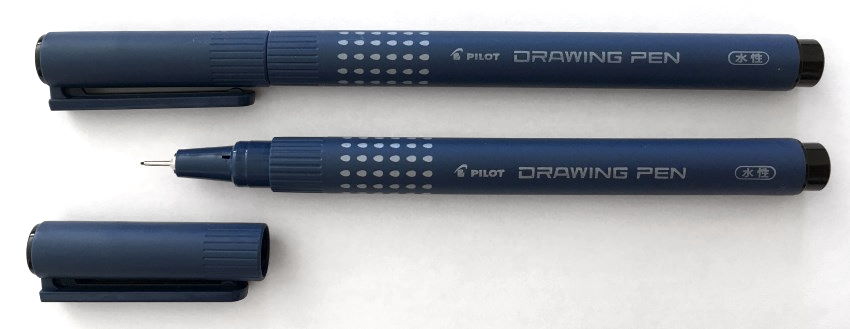 Pilot Drawing Pen
Pilot Drawing Pen
Pros:
- Waterproof pigmented ink
- Caption on the top part of the cap to quickly find the desired size
- Affordable price
Cons:
- Nib size not written on the pen's body
- Simple structure
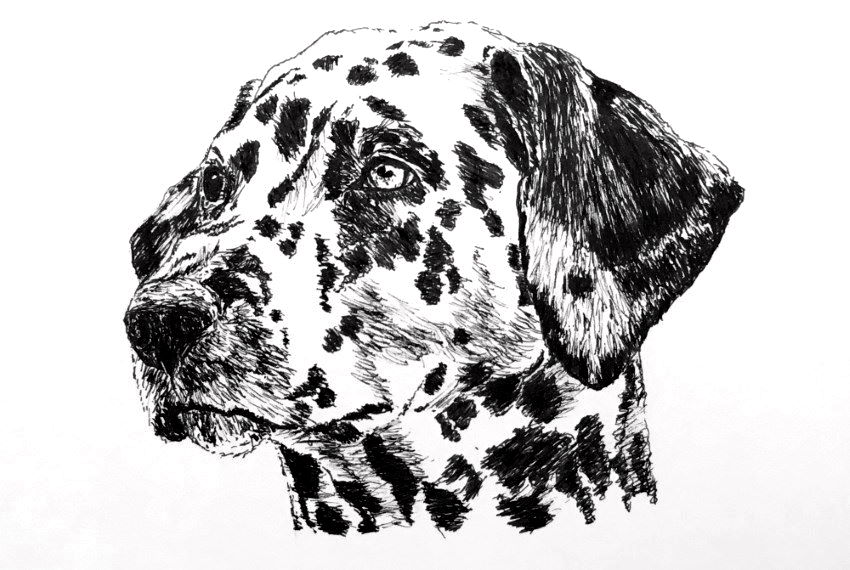 Dalmatian Dog with Pilot Drawing Pen
Dalmatian Dog with Pilot Drawing Pen
Conclusion:
These pens are quite smooth and therefore great for doodling, mandalas, and writing. Less ideal for fine art drawing or sketching.
11. Zig Mangaka
Zig Mangaka are artist-grade, water-based pens designed for drawing manga and comics.
Nib sizes: 7
Mangaka is part of Zig Cartoonist, which are products for use by professional manga/cartoon artists and graphic designers. They are great for sketching, doodling, or any form of art.
Size 01 is available in 5 colors.
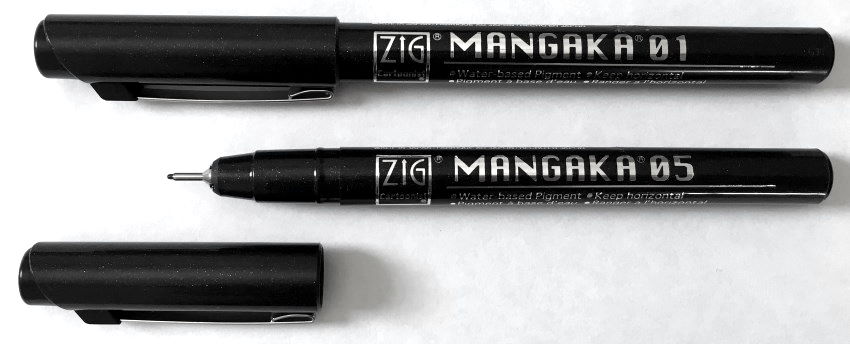 Zig Mangaka
Zig Mangaka
Pros:
- Smudge-proof
- Lightfast, water-based pigment, xylene-free, odorless
- Caption on the top part of the cap to quickly find the desired size
- Affordable price
Cons:
- Simple structure
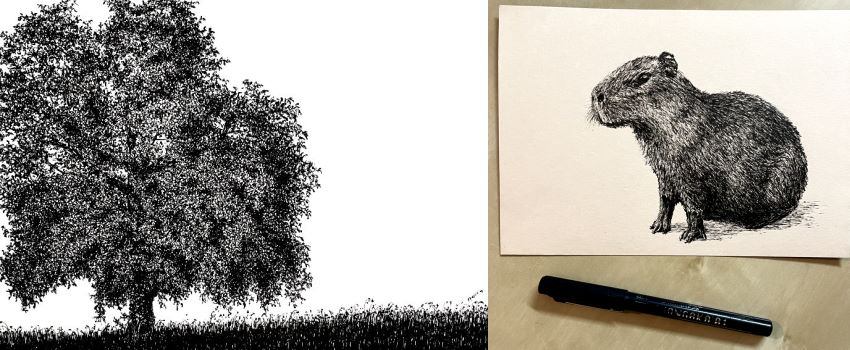 Walnut tree and capybara
Walnut tree and capybara
Good to know:
Mangaka is the Japanese word for a manga artist. Manga is the word for Japanese comics or graphic novels.
Conclusion:
These pens are amazing. Small and lightweight, easy to work with. They feel natural when drawing. Highly recommended!
Author's comment:
If you want to learn how to draw any tree realistically (with pens):

Visit to my guide for drawing trees.
12. Zig Millennium
Another great product from Kuretake, the Zig Millennium, is a professional artist pen for sketching.
They are part of the Zig Memory System, which is a line of products designed for scrapbooking, journaling, and card making, with water-based pigment ink to preserve for future generations.
Nib sizes: 6
They also exist in 8 colors.
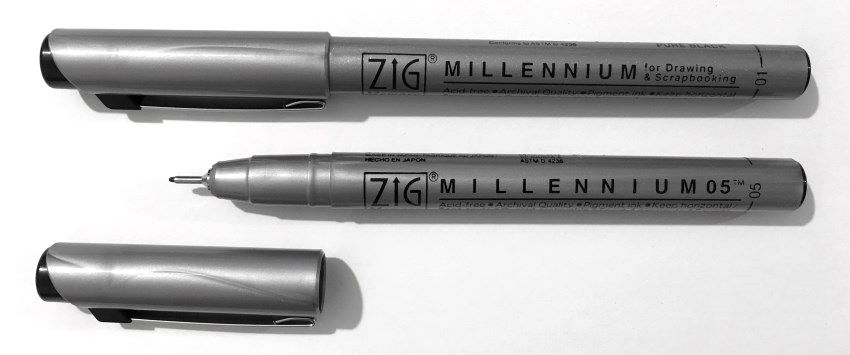 Zig Millennium
Zig Millennium
These are of archival quality, and in addition to sketching, they are great for signature work.
Other than that, Zig Millennium is identical to Zig Mangaka, both in structure and in quality:
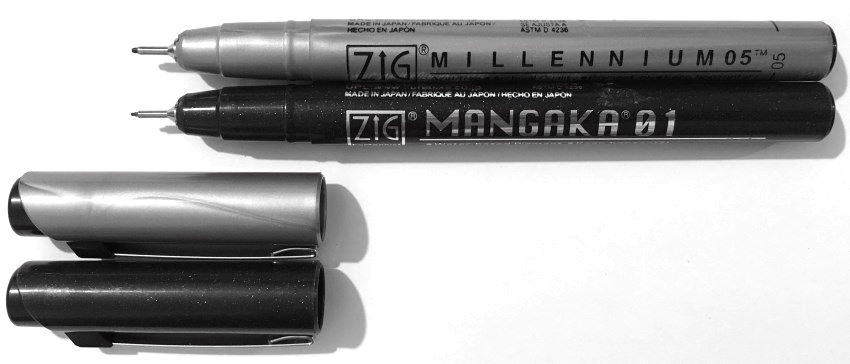 Millennium vs. Mangaka
Millennium vs. Mangaka
Pros:
- Acid-free
- Archival quality
- Pigment ink
- Caption on the top part of the cap to quickly find the desired size
- Affordable price
Cons:
- Simple structure
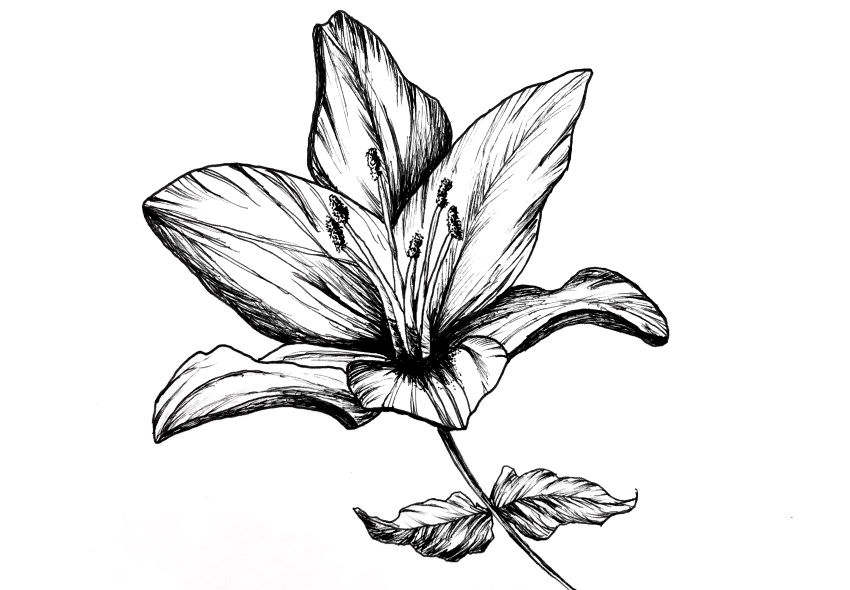 Flower with Zig Millennium
Flower with Zig Millennium
Author's comment:
For flower art with pens, like the examples below:

You are welcome to visit my guide for drawing flowers.
13. Deleter Neopiko Line 3
Deleter is a manufacturer of art materials for manga artists and cartoonists.
Neopiko Line 3 is another example of a great drawing pen, with water-based pigment ink of top quality.
Nib sizes: 8
They come in 3 colors: black, gray, and sepia.
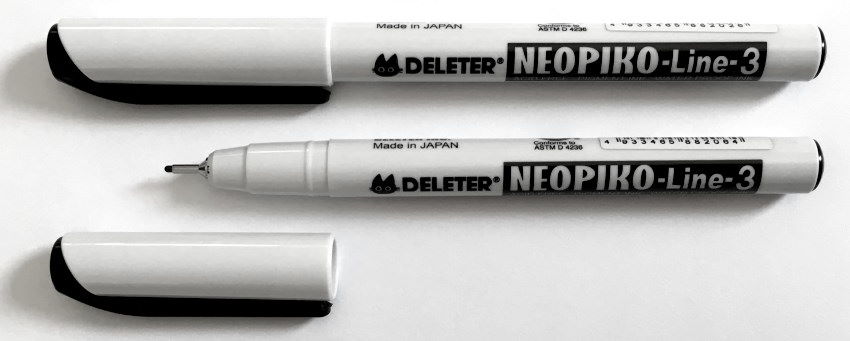 Neopiko Line 3
Neopiko Line 3
By another, I mean it is identical in structure to Zig Mangaka and Zig Millennium, and all three pens have quality ink.
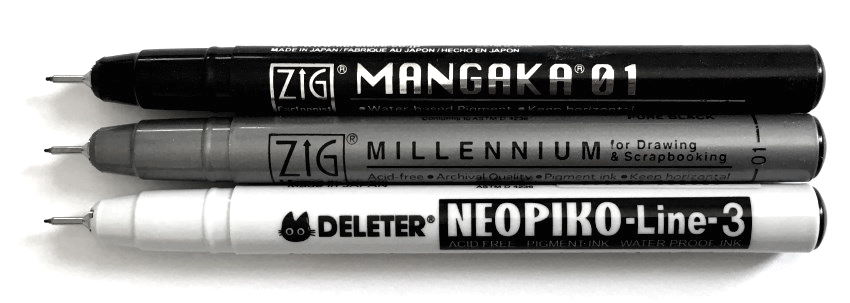 Mangaka vs. Millennium vs. Neopiko
Mangaka vs. Millennium vs. Neopiko
Cartoon test:
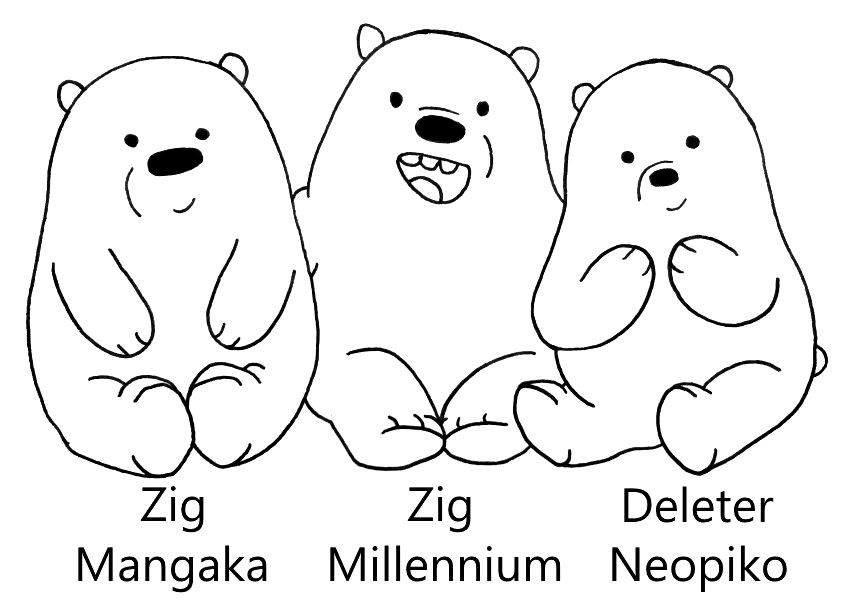 We Bare Bears pen drawing
We Bare Bears pen drawing
As expected from fine liners for manga, they all work perfectly with Copic markers.
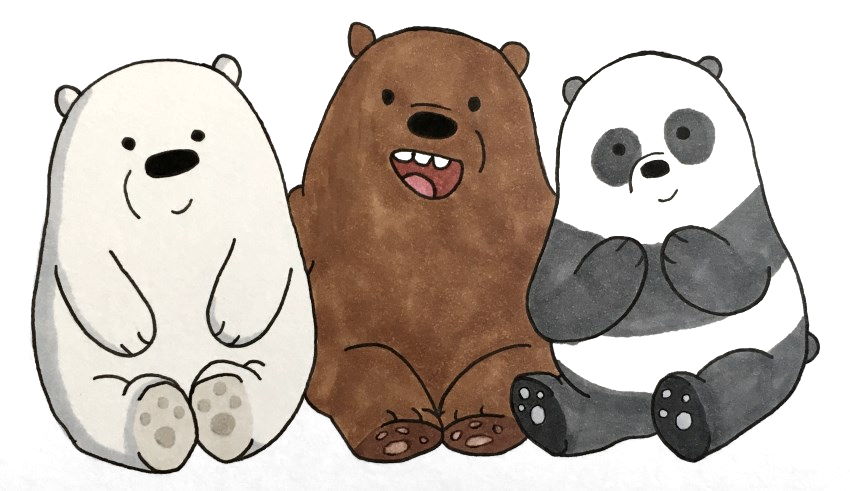 We Bare Bears coloring with Copics
We Bare Bears coloring with Copics
Pros:
- Waterproof, lightfast, and archival
- Smooth and durable high-quality nib
- Smudge-proof with alcohol-based and water-based markers
- Caption on the top part of the cap to quickly find the desired size
Cons:
- Simple structure
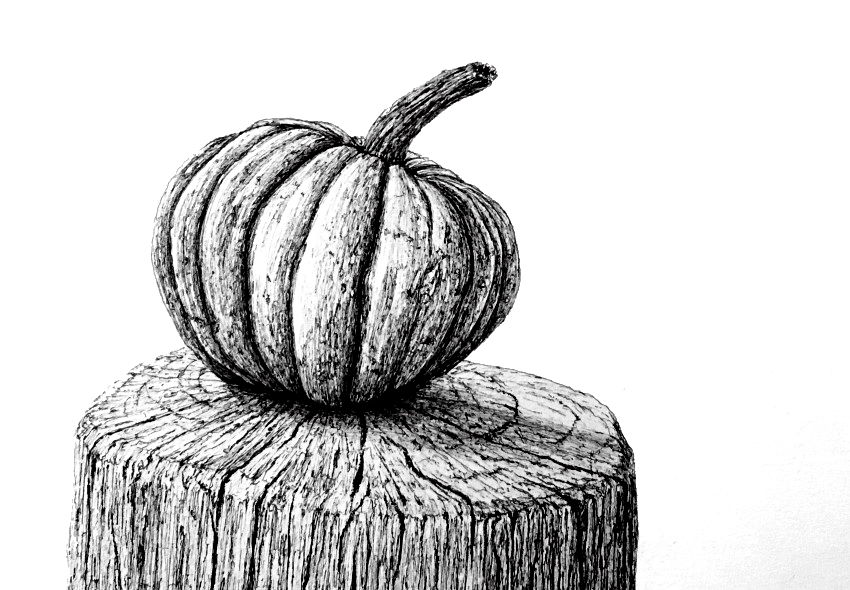 Pumpkin with Neopiko
Pumpkin with Neopiko
Conclusion:
This pen is perfect for any drawing style!
Since Neopiko pens are quite similar to Zig fine liners, selecting one over the other is a matter of price.
Author's comment:
With some pens, you can produce both well-defined lines when perpendicular to the drawing surface and less defined lines when diagonal, which gives them a lighter value.
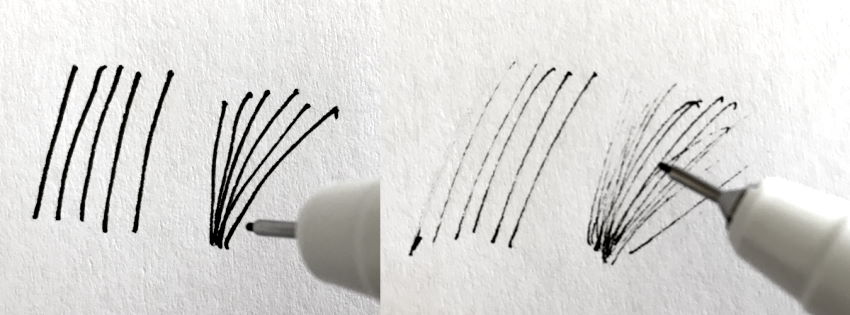
You can use that to draw different brightness values with a pen.
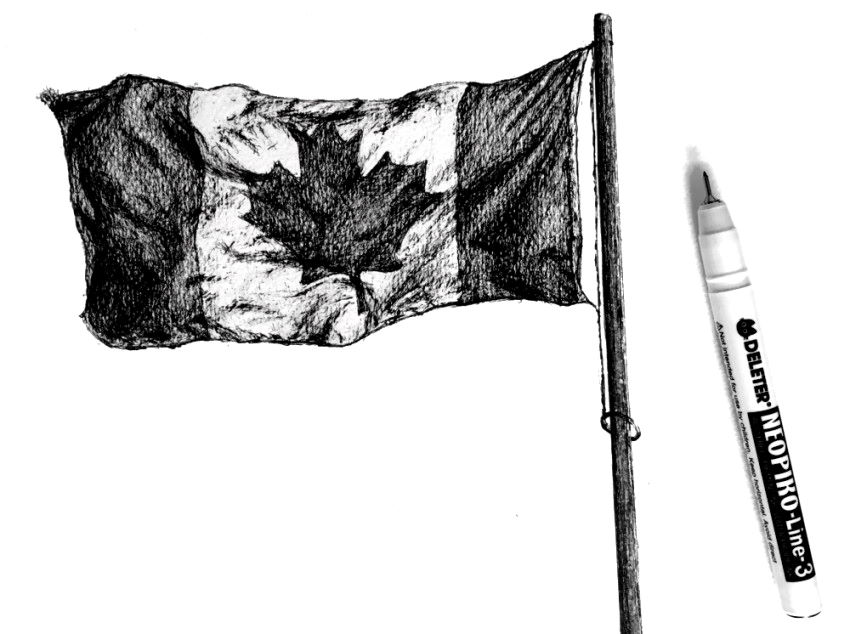
For more control over brightness values, I use pencils.
14. Ohuhu Fine Line Drawing Pen
Ohuhu is a manufacturer of drawing supplies, with a focus on markers.
Fine Line Drawing Pens are artist-grade pens that work perfectly with markers.
Nib sizes: 6 (plus 1.0 thick nib and brush)
They look and work the same as the above 3 pens (Zig Mangaka, Zig Millennium, and Deleter Neopiko Line 3).
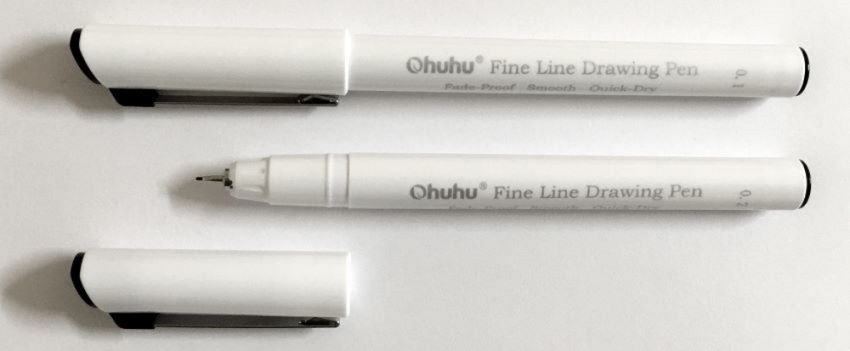 Ohuhu Fine Line Drawing Pen
Ohuhu Fine Line Drawing Pen
Pros:
- Rich water-based ink
- Works great with markers
- Non-toxic, waterproof, fade-proof
- Caption on the top part of the cap to quickly find the desired size
Cons:
- Simple structure
- They only come as a set
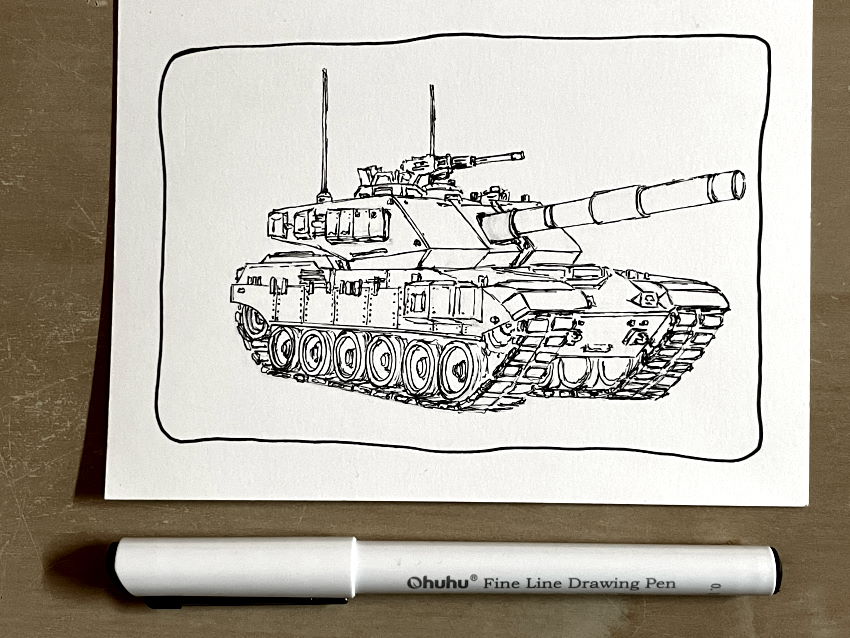 Tank with Ohuhu pen
Tank with Ohuhu pen
After the ink is dry, I color with markers.
For a nostalgic illustration style, choose muted colors (less saturated).
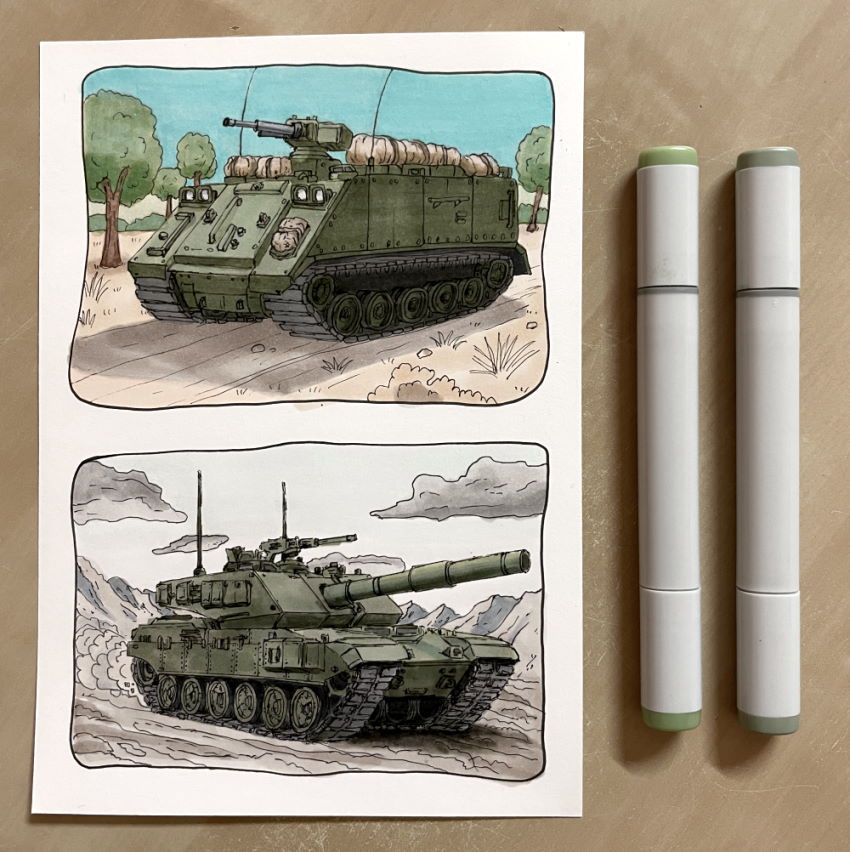 Coloring with markers
Coloring with markers
Conclusion:
Arguably the most affordable when buying a set of 8, yet high-quality.
As expected from Ohuhu, these pens work perfectly with markers.
15. Tombow MONO Drawing Pen
Tombow MONO are disposable, water-based, pigment ink drawing pens.
Nib sizes: 3
These pens are quite smooth, and their ink dries instantly!
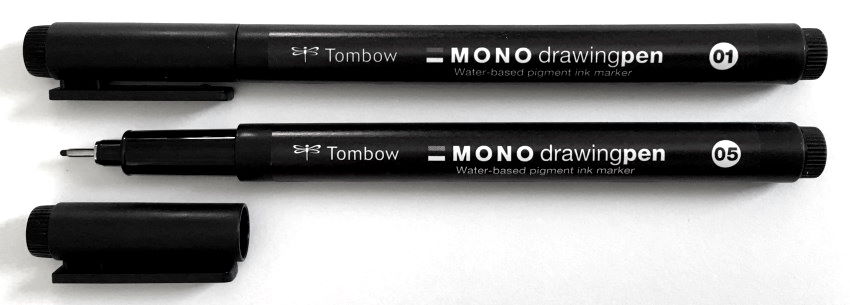 Tombow MONO Drawing Pen
Tombow MONO Drawing Pen
Pros:
- Smudge-proof, ink dries instantly!
- Durable nib
- Caption on the top part of the cap to quickly find the desired size
Cons:
- Only 3 nib sizes
- Can leave dots while drawing if not careful
- Simple structure
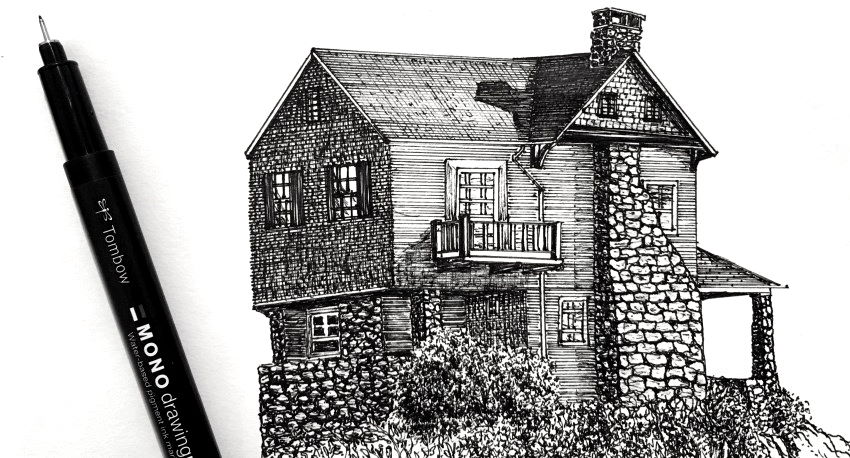 Country house with Tombow MONO
Country house with Tombow MONO
Conclusion:
These pens are smooth, but if the nib is not removed immediately from the drawing paper after each mark, it will leave a dot of ink.
Therefore, less recommended for technical drawing.
They are great for beginners because their nib is durable and does not bend.
And, since their ink dries instantly, there is less chance of smudging.
In addition, they are great for doodling.
16. OHTO Graphic Liner
OHTO Graphic Liner is a needlepoint drawing pen with a strong black ink.
Nib sizes: 6
According to OHTO, these drawing pens can be left uncapped for at least 2-3 days without drying.
*I tested one of my OHTO pens (left it uncapped for 24 hours), and it works perfectly.
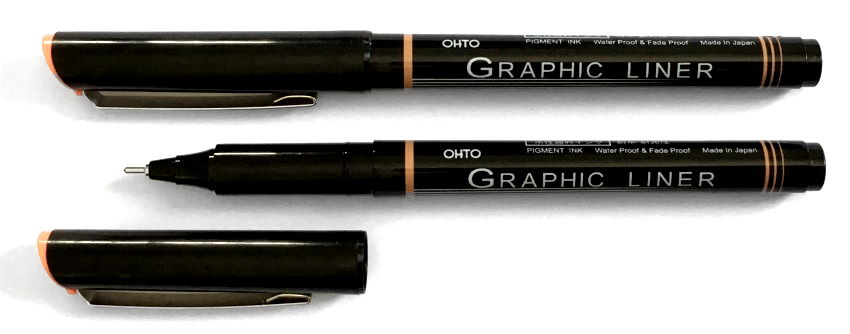 OHTO Graphic Liner
OHTO Graphic Liner
Pros:
- Pigmented ink, waterproof, archival
- Needlepoint rollerball, which does not wear over time
- These drawing pens can be left with the cap off while sketching or drawing
- Caption on the top part of the cap to quickly find the desired size
Cons:
- Simple structure
- Smudges on smooth paper
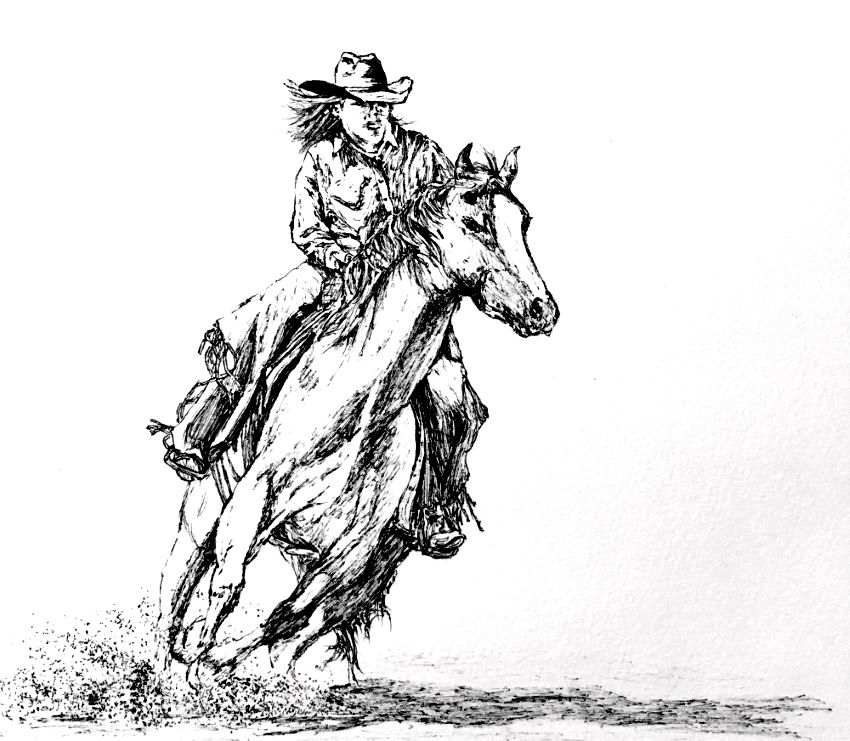 Cowgirl with OHTO Graphic Liner
Cowgirl with OHTO Graphic Liner
Conclusion:
Having a needlepoint makes these pens great for beginners since they are durable. They are suitable for writing and for quick sketches or any graphic design work.
Fun to work with, but it smudges on some types of paper.
17. Rotring Tikky Graphic
Rotring Tikky Graphic is a quality disposable technical pen.
Nib sizes: 7
This pen has a great grip, and it is very comfortable even after long sessions of drawing.
The ink flows smoothly and consistently.
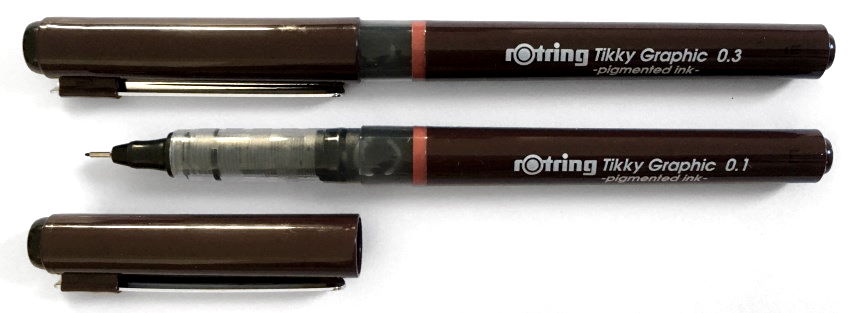 Rotring Tikky Graphic
Rotring Tikky Graphic
Pros:
- Comfortable
- Durable
- Waterproof pigmented ink
- Caption on the top part of the cap to quickly find the desired size
- Good for filling large areas
Cons:
- Spews ink
- Dries slowly
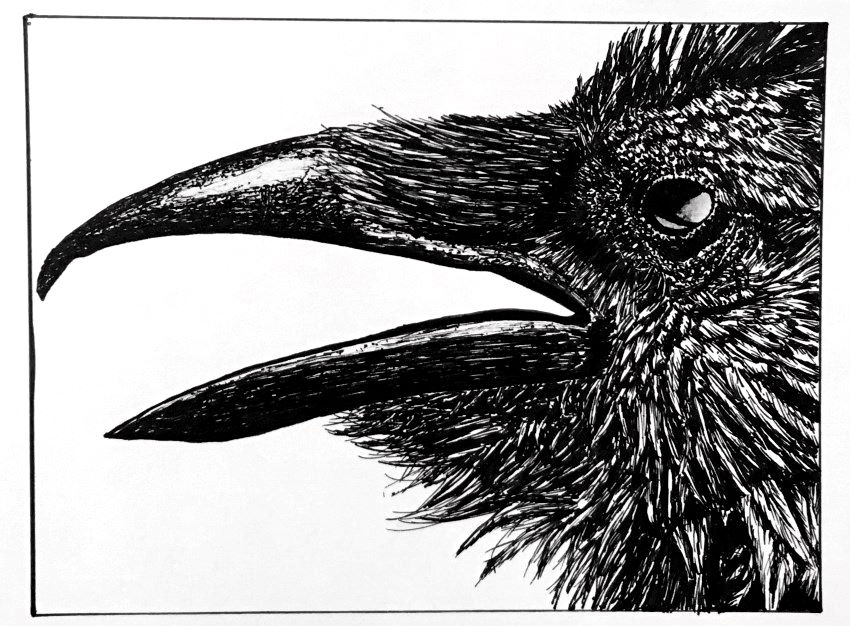 Crow with Rotring Tikky Graphic
Crow with Rotring Tikky Graphic
Conclusion:
For artists that like pens with flowing ink, this pen is perfect.
It can leave a stain of ink if the pen is not quickly removed from the drawing paper.
It takes a while for the ink to dry (compared to other brands in this review), and therefore it will smudge if not treated carefully.
Ink is dark, rich, and super beautiful.
Pen Drawing Tips
Inking edge rulers:
When drawing in perspective, it is important to use a ruler.
A regular ruler may smudge the ink.
An inking edge is an edge that is raised above the drawing surface.

Many types of rulers come with an inking edge.
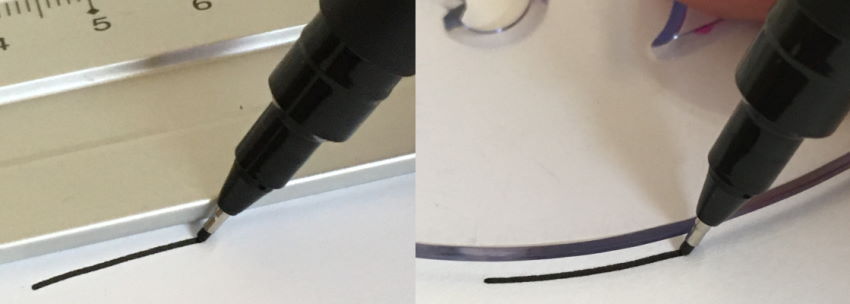
Paper:
I use the same drawing paper brands for both for pencils and pens.
A thicker paper is more durable and prevents ink from bleeding to the paper below.
Here is my guide and review on drawing materials and my drawing-paper guide.
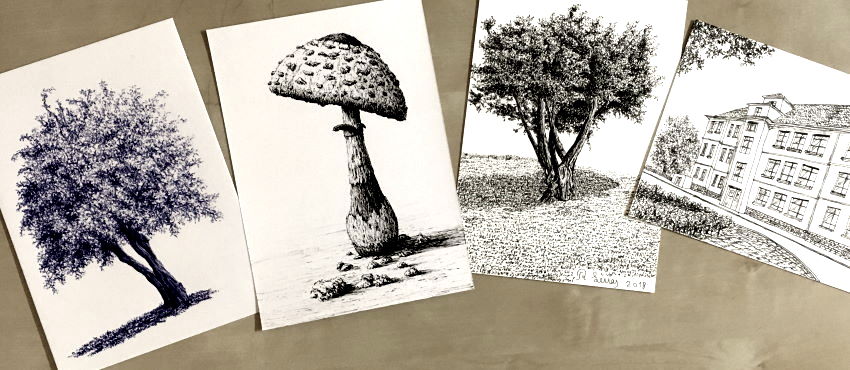
Light pens:
You can use a light fine liner to draw concept art, product design, or a quick sketch from observation.
Once the result is satisfying, you can go over it with a black fine liner.
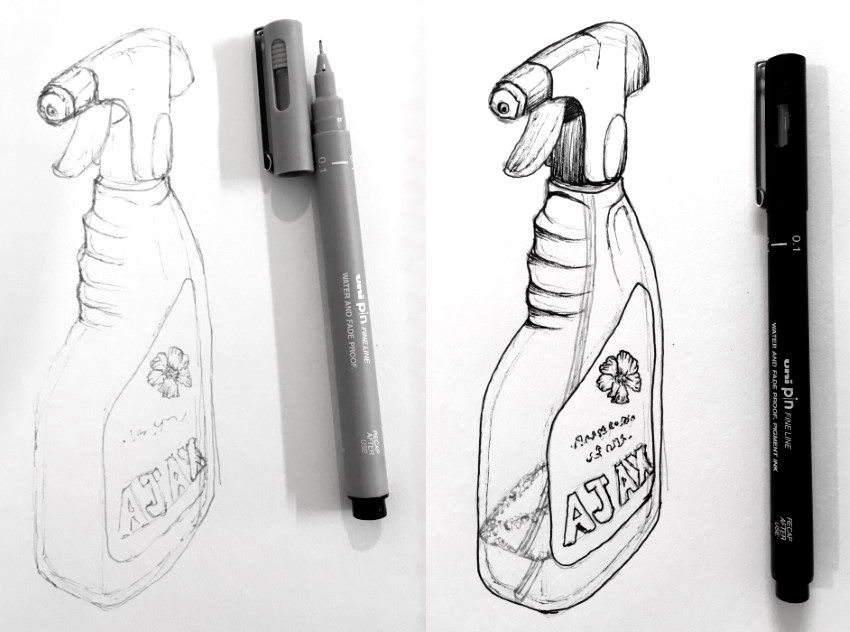
For the final render, you can use markers.
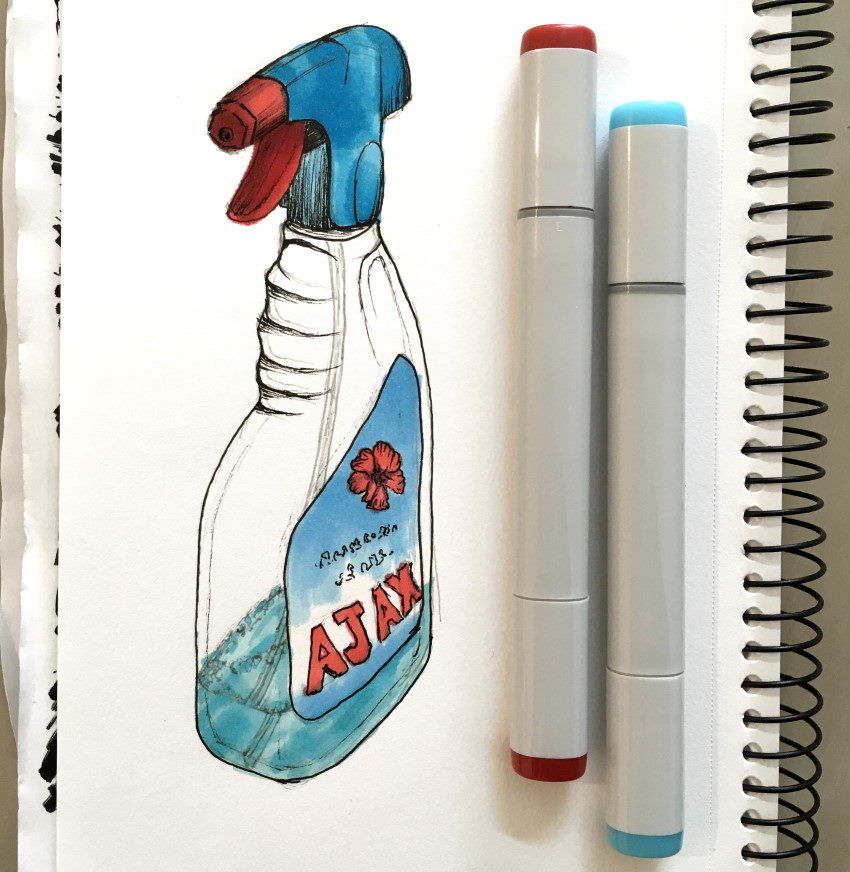
If you like drawing from direct observation, visit my still life composition guide.
Mistakes:
When you have a mistake, do not try to fix it.
Too many lines look bold and grab attention. Continue drawing, disregarding the mistake.
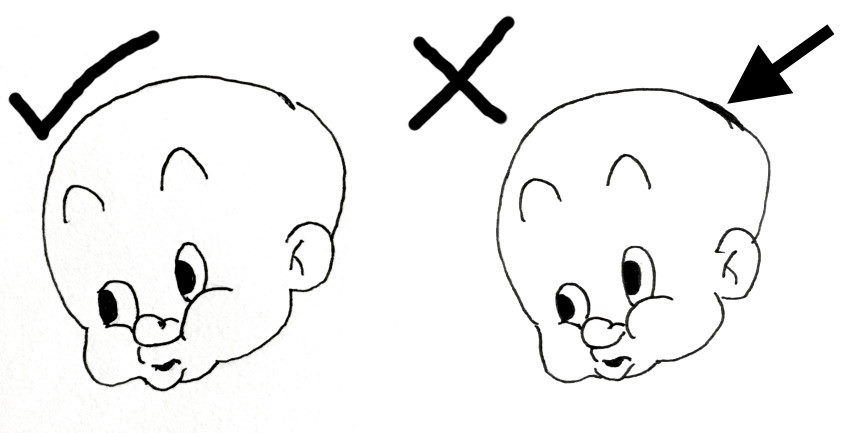
Colored Pens:
As mentioned above, many brands offer colored pens.
They work the same, though some of them are lighter in value, and therefore it is easier to create a transition in values with them.

Use the pen at an angle to draw lighter values (less defined lines).
A grainy paper is better for drawing textures.
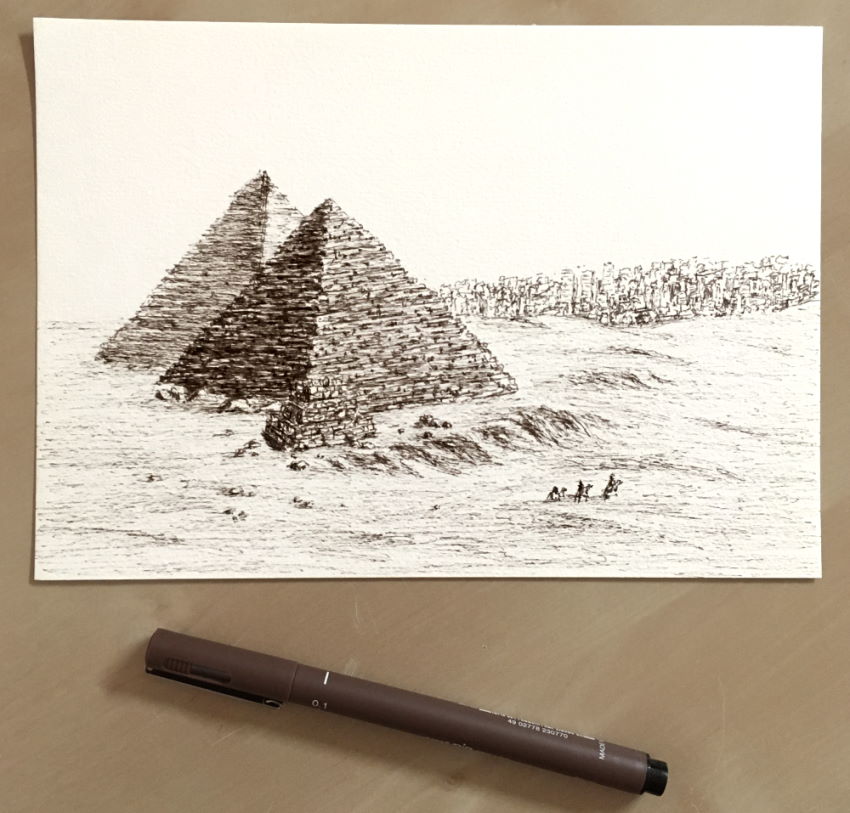
Note:
Drawing with a fine liner at an angle is how I draw textures for maps.
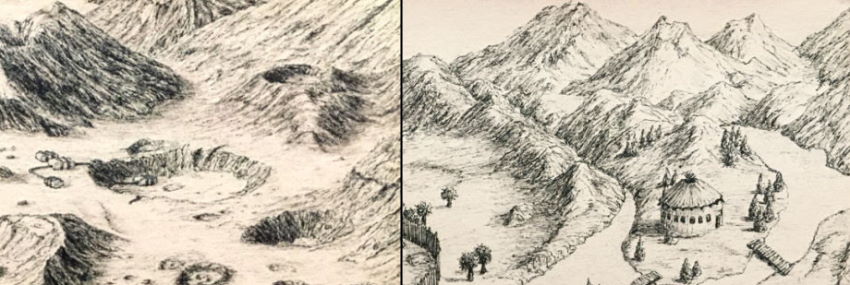
Here is my map drawing guide.
Water-Resistant and Lightfastness Test
I drew some lines for most pen brands I have in order to test their resistance to water.
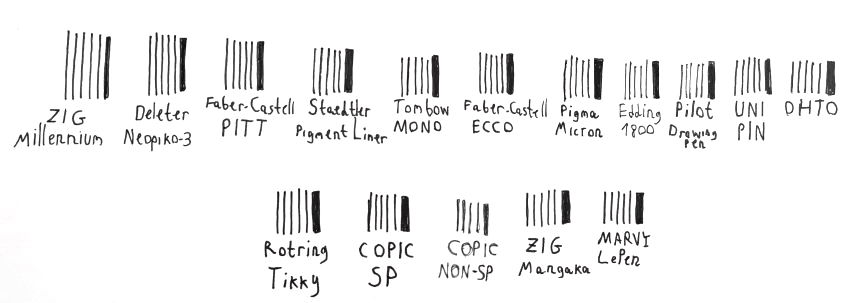
Then, I used a synthetic brush with water.
As expected from top-quality pens, all lines are still in their original shape with no smudge.
The richest and strongest blacks (Uni Pin, Ohto, and Rotring) released a bit of color to the surrounding area.
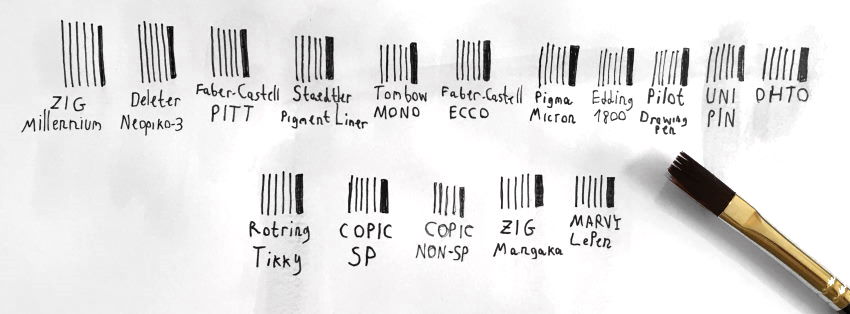
Lightfastness test:
I hung this paper in direct sunlight for a week, and all pens passed the test.
The next example is my drawing of Tintin after a year of direct sunlight.
Marker colors are faded and desaturated, while technical pen marks are still bold and in perfect condition.
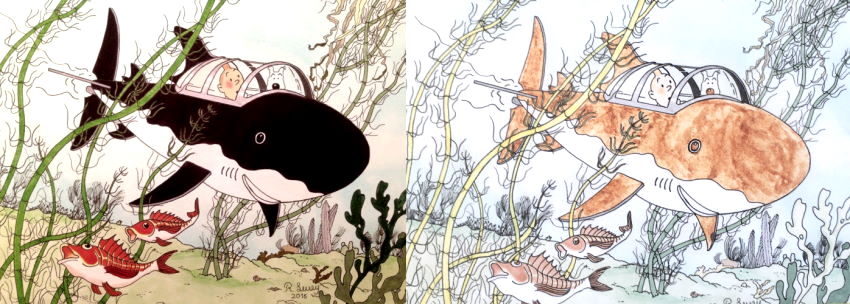 Before and after exposure to the sun
Before and after exposure to the sun
Summary
Combined with knowledge in drawing, these pens can produce beautiful artworks.
They are an excellent choice for drawing cartoon characters, and, as mentioned above, they work well with artist-grade markers.
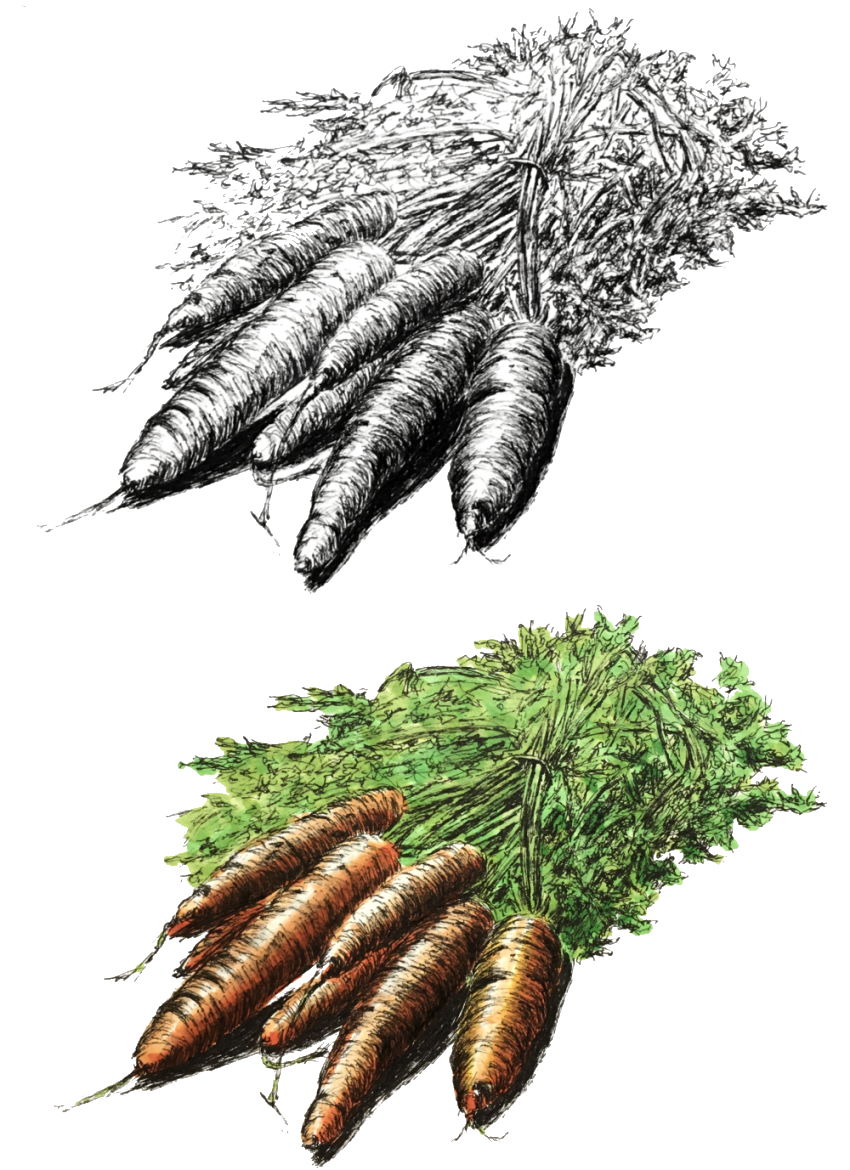
Important:
- Pressing hard with a technical pen while drawing can scratch the paper sheet and damage it.
- Some technical pens have a thin and gentle nib, especially the small sizes, which can bend if pressed hard.
- I store my pens horizontally.
Keep in mind:
Another tool for drawing and sketching anything, anywhere, is a mechanical pencil.
The advantage of a mechanical pencil is that you can erase mistakes and that you do not need to sharpen it.
The advantage of a technical pen is that it is permanent, and it does not smudge.
To learn more on how to use mechanical pencils, visit my guide on how, when, and why to draw with a mechanical pencil.
Where to go next:
For more actual drawings with these pens, visit my tutorial on how to draw depth. It highlights 15 methods to add depth, including many examples.

If you like drawing realistically, visit my guide on realistic drawing for beginners.
